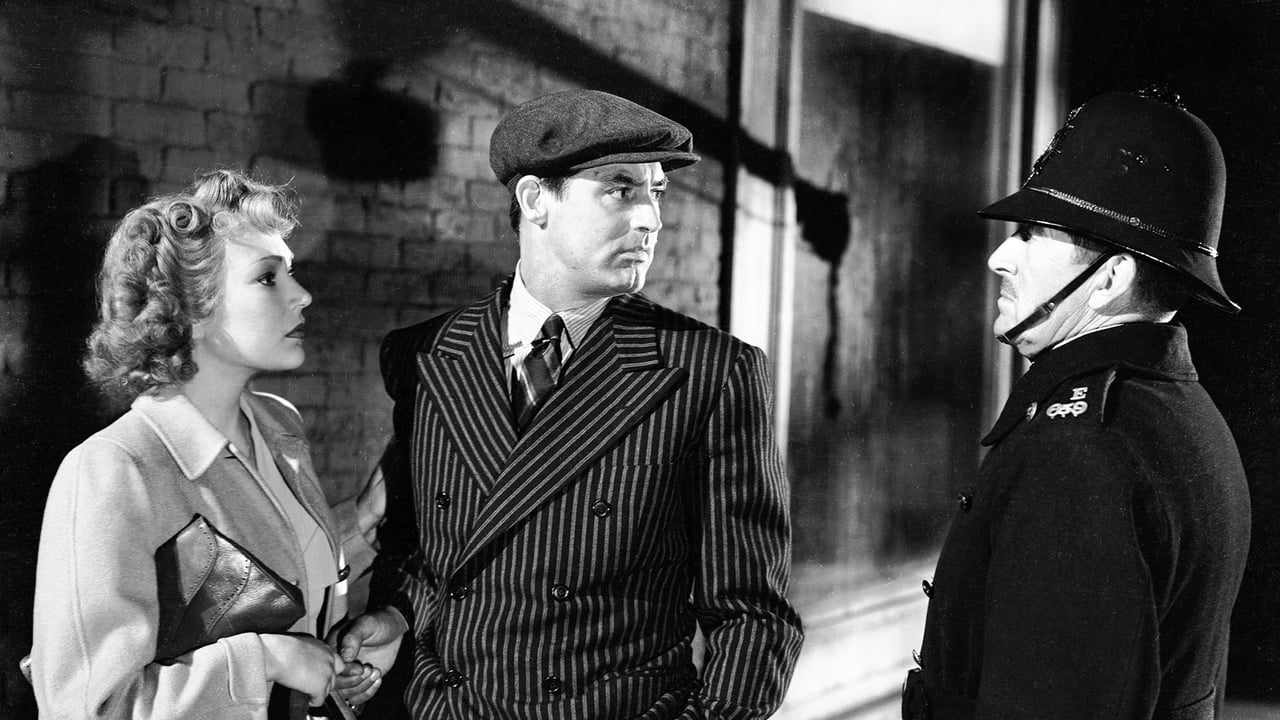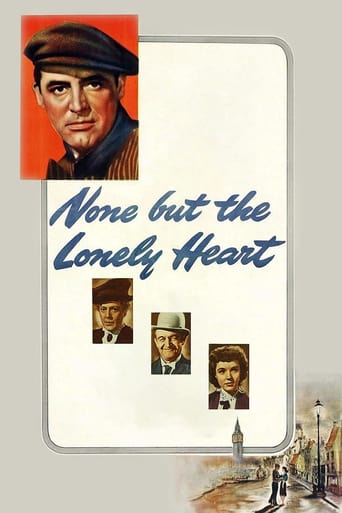RyothChatty
ridiculous rating
Aedonerre
I gave this film a 9 out of 10, because it was exactly what I expected it to be.
Billie Morin
This movie feels like it was made purely to piss off people who want good shows
JohnHowardReid
Cary Grant (Ernie Mott), Ethel Barrymore (Ma Mott), Barry Fitzgerald (Twite), June Duprez (Ada), Jane Wyatt (Aggie Hunter), George Coulouris (Jim Mordiney), Dan Duryea (Lew Tate), Konstantin Shayne (Ike Weber), Eva Leonard Boyne (Ma Chalmers), Morton Lowry (Taz), Helene Thimig (sister nurse), William Challee (Knocker), Joseph Vitale (Cash), Roman Bohnen (Dad Pettyjohn), Renie Riano (Flo), Queenie Vassar (Ma Snowden), Art Smith (Marjoriebanks), Rosalind Ivan (Mrs Tate), Walter Soderling (Pa Floom), Bill Wolfe (blind man), Eric Wilton, David Thursby (prison guards), Sammy Blum, Alec Harford (drunks), Skelton Knaggs (Slush), Forrester Harvey (bloke), Tiny Jones (woman).Director/screenplay: CLIFFORD ODETS, from 1943 novel by Richard Llewellyn. Cinematography: George Barnes. Film editor: Roland Gross. Music: Hanns Eisler. Art direction: Albert S. D'Agostino, Jack Okey. Producer: David Hempstead. Associate producer: Sherman L. Todd.Copyright 20 October 1944 by RKO Radio. New York opening at the Strand: 17 November 1944. U.S. release: 22 September 1944. U.K. release: 16 April 1945. Aust.: 12 April 1945. 10,382 feet. 115 minutes.SYNOPSIS: Poverty forces Cockney mother and son into crime.NOTES: "None But the Lonely Heart" was selected as the Best Film of 1944 by the National Board of Review. Ethel Barrymore and June Duprez (along with eight other players) were cited for Best Acting.COMMENT: A haunting and moving film. Great playwright that he is (Golden Boy, Waiting for Lefty), Odets — in his first try — proves that he is just as forceful in film directing. The dramatic scenes in this picture come across with an intensity that mere words are powerless to describe.Production designer Mordecai Gorelik's sets impress, and the players, led by Grant, Barrymore, Fitzgerald and Duprez, are absolutely flawless.Unfortunately, despite its power and conviction, the movie was not as successful as Fox's adaptation of an earlier Llewellyn novel, "How Green Was My Valley". Yet it has similar themes of poetry and idealism struggling against a depressing background of poverty and want. "None But the Lonely Heart", rich in atmosphere and realistic effects, is just as memorable — and is perhaps a braver and more faithful translation of its author's ideas and ideals.
utgard14
Ne'er-do-well drifter Ernie Mott (Cary Grant) returns home to London, where he learns his mother (Ethel Barrymore) has cancer. He decides to stay and help her run her shop but falls in love with a gangster's ex-wife and turns to crime. The film directorial debut of playwright Clifford Odets is a dreary, unexciting tale with nice performances from Ethel Barrymore and a miscast Cary Grant. The character in the book this is based upon is much younger than Grant is in this. The part's rewritten with him in mind but still feels like it would have been a better fit for a younger man. Grant does a decent job, though. The supporting cast includes lovelies June Duprez and Jane Wyatt, as well as the great Barry Fitzgerald. Unfortunately, he's not utilized to his full potential here. It's an unmoving social drama that goes on too long and has some rather forced WW2 elements that feel tacked-on. There's also a stagy feel to things, in large part due to the talky script where one can easily imagine Grant or Barrymore speaking to an audience instead of the other characters in the film.
l_rawjalaurence
Based on the novel by Richard Llewellyn, with a script by Clifford Odets (who also directed it), NONE BUT THE LONELY HEART is a socially conscious film, readily recognizable as the work of the author of WAITING FOR LEFTY (a classic social drama of the mid-Thirties), Ernie Mott (Cary Grant) lives in the back-streets of London, trying to eke out an existence while living with his mother (Ethel Barrymore). The two of them fight like cat and dog, but once Ernie discovers that his mother is terminally ill, he vows to stay with her no matter what the consequences. Short of money, Ernie resorts to a life of crime, working for local mobster Jim Mordinoy (George Colouris), and is eventually arraigned by the police after a car-chase (more reminiscent of the streets of Depression-era Chicago than London). Released on bail by a friendly pawnbroker (Konstantin Shayne), Ernie discovers to his horror that his mother, while pretending to lead a respectable life in her own pawn-shop, has also been involved in a life of crime. The two of them are reconciled on her death-bed, but Ernie has to face the future on his own. Although the settings are somewhat stagy, the sincerity of this drama is not in doubt: Odets has a gift for creating memorable sequences, with a clever use of light and shade suggesting Ernie's imprisonment. Although not actually in jail, he cannot escape his existence: the desperate search for money to live on will never end. Nonetheless he resolves to face the future with equanimity - in a time of war, it's important for everyone to forget their individual grievances and pull together. This is suggested in a memorable exchange at the end with Henry Twite (Barry Fitzgerald), as the two of them look down at the River Thames flowing beneath them, and walk to the river- side down a flight of stairs. As Ernie, Grant gets the chance to demonstrate his virtuosity as an actor; normally associated with light comedy, he rarely had the chance to grapple with meatier, tragic roles. The scene where he suddenly discovers the seamier side of life, as he watches the pawnbroker being beaten up by Mordinoy's gang is particularly memorable: Odets repeatedly cuts to reaction-shots of his facial expression gradually changing, and then cuts back to a medium shot as Grant/Ernie fells one of the gang-members who is about to hit a defenseless old man. While NONE BUT THE LONELY HEART is a propaganda peace, released in the penultimate year of World War II, it nonetheless has a social message that can be understood by everyone about the necessity to eliminate poverty by caring for others around us.
MARIO GAUCI
This film is renowned for starting off Ethel Barrymore on her belated screen career (after a couple of tryouts made much earlier, including one – the as-yet unwatched RASPUTIN AND THE EMPRESS {1933} – with siblings Lionel and John!); she won a Best Supporting Actress Oscar for her fine work here – in all, the legendary star would be nominated four times in the 10-year span until her death. Two other notable elements to the movie under review is its being one of only two titles helmed by respected playwright Odets (the other being THE STORY ON PAGE ONE {1959} which, again, I own but still need to go through) and the fact that it landed nominal lead Cary Grant his second and last Academy Award nod (having previously been shortlisted for George Stevens' romantic drama PENNY SERENADE {1941}) until being bestowed with an Honorary "Lifetime Achievement" golden statuette in 1970 (and, in fact, he mentioned these two directors specifically in that speech). The film was based on a novel by Richard Llewellyn, whose "How Green Was My Valley" had just been brought to the screen by John Ford and managed to sweep, or should I say swipe, five Oscars including Best Picture and Direction at the 1942 ceremony: while an undeniably excellent effort, it notoriously triumphed over such superior candidates as the seminal debut of both Orson Welles and John Huston – namely CITIZEN KANE and THE MALTESE FALCON respectively! It is safe to assume that NONE BUT THE LONELY HEART clearly aimed at repeating the success of HOW GREEN WAS MY VALLEY: while it did garner a total of four nominations (the other two being in the Best Editing and Dramatic/Comedy Score departments), the narrative in this case did not quite have the necessary to obtain a comparable level of quality. Among Llewellyn's other credits were NOOSE (1948), a little-known but pretty good British noir he personally adapted from his play and which co-starred Maltese character actor Joseph Calleia. Anyway, Grant here is a wanderer forever flanked by a pitbull who returns to his London home intending to stay for only a short while, but two events (learning of shopkeeper mother Barrymore's terminal illness – their relationship is otherwise strained – and falling for June Duprez – married to scoundrel George Coulouris) lead to a change of mind and eventually ground him. For the young woman's sake, he becomes embroiled in her husband's criminal schemes (one of their victims being Konstantin Shayne, a close acquaintance of Barrymore's, in a robbery sequence which, along with a car crash later on, constitute action highlights amid the general verbosity) and, to complicate matters further, the old woman is herself arrested for dealing in stolen goods! In the end, while resigning himself to his mother's loss, he follows her advise to find a "good" rather than a "cheap" woman – and he settles on musician Jane Wyatt (the title, in fact, refers to a Tchaikovsky composition she plays on her violin: she had loved him all along, but was willing to sacrifice her personal happiness after Grant professed his feelings for Duprez to her!).Making for unusual wartime fare – which proves interesting without being particularly compelling – the film certainly deserves a mark for trying. Still, the London detail is unconvincing and the cast decidedly variable: the afore-mentioned Grant (rather effective in a rare depiction of his true Cockney origins, apart from the final descent into bathos), Barrymore, Coulouris and Shayne come off best, as well as Barry Fitzgerald (also in HOW GREEN WAS MY VALLEY and who made Oscar history that same year by being nominated twice for his role in GOING MY WAY – being thus in direct competition with the star in the Best Actor stakes while emerging the winner, and therefore Barrymore's male counterpart, in the Supporting category!); on the other hand, Wyatt and Duprez are somewhat weak under the circumstances, whereas Dan Duryea is thoroughly wasted as a bartender.

